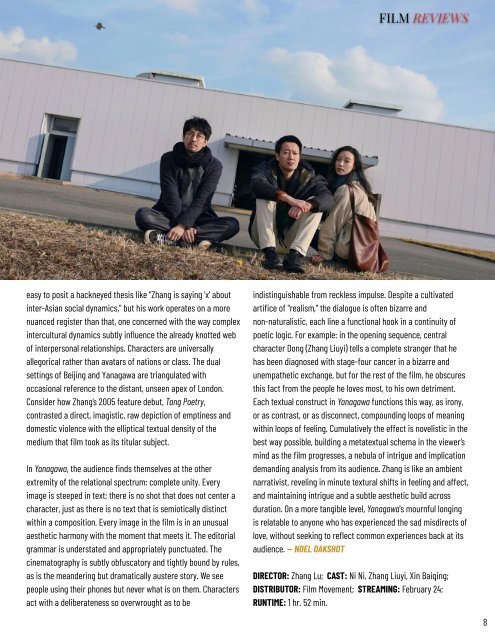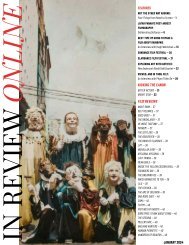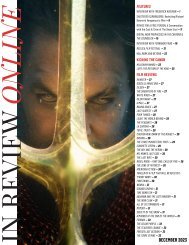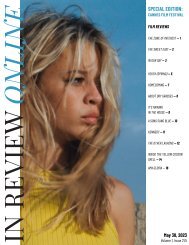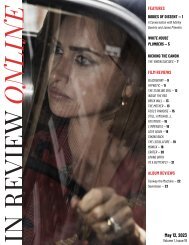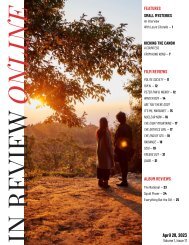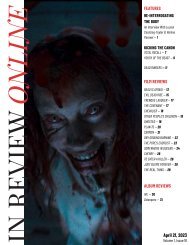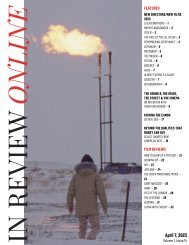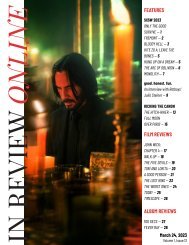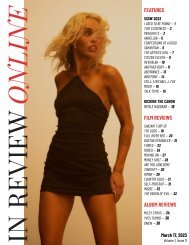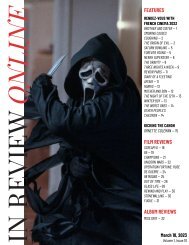You also want an ePaper? Increase the reach of your titles
YUMPU automatically turns print PDFs into web optimized ePapers that Google loves.
FILM REVIEWS<br />
easy to posit a hackneyed thesis like "Zhang is saying 'x' about<br />
inter-Asian social dynamics," but his work operates on a more<br />
nuanced register than that, one concerned with the way complex<br />
intercultural dynamics subtly influence the already knotted web<br />
of interpersonal relationships. Characters are universally<br />
allegorical rather than avatars of nations or class. The dual<br />
settings of Beijing and Yanagawa are triangulated with<br />
occasional reference to the distant, unseen apex of London.<br />
Consider how Zhang’s 2005 feature debut, Tang Poetry,<br />
contrasted a direct, imagistic, raw depiction of emptiness and<br />
domestic violence with the elliptical textual density of the<br />
medium that film took as its titular subject.<br />
In Yanagawa, the audience finds themselves at the other<br />
extremity of the relational spectrum: complete unity. Every<br />
image is steeped in text; there is no shot that does not center a<br />
character, just as there is no text that is semiotically distinct<br />
within a composition. Every image in the film is in an unusual<br />
aesthetic harmony with the moment that meets it. The editorial<br />
grammar is understated and appropriately punctuated. The<br />
cinematography is subtly obfuscatory and tightly bound by rules,<br />
as is the meandering but dramatically austere story. We see<br />
people using their phones but never what is on them. Characters<br />
act with a deliberateness so overwrought as to be<br />
indistinguishable from reckless impulse. Despite a cultivated<br />
artifice of "realism," the dialogue is often bizarre and<br />
non-naturalistic, each line a functional hook in a continuity of<br />
poetic logic. For example: in the opening sequence, central<br />
character Dong (Zhang Liuyi) tells a complete stranger that he<br />
has been diagnosed with stage-four cancer in a bizarre and<br />
unempathetic exchange, but for the rest of the film, he obscures<br />
this fact from the people he loves most, to his own detriment.<br />
Each textual construct in Yanagawa functions this way, as irony,<br />
or as contrast, or as disconnect, compounding loops of meaning<br />
within loops of feeling. Cumulatively the effect is novelistic in the<br />
best way possible, building a metatextual schema in the viewer’s<br />
mind as the film progresses, a nebula of intrigue and implication<br />
demanding analysis from its audience. Zhang is like an ambient<br />
narrativist, reveling in minute textural shifts in feeling and affect,<br />
and maintaining intrigue and a subtle aesthetic build across<br />
duration. On a more tangible level, Yanagawa's mournful longing<br />
is relatable to anyone who has experienced the sad misdirects of<br />
love, without seeking to reflect common experiences back at its<br />
audience. <strong>—</strong> NOEL OAKSHOT<br />
DIRECTOR: Zhang Lu; CAST: Ni Ni, Zhang Liuyi, Xin Baiqing;<br />
DISTRIBUTOR: Film Movement; STREAMING: February 24;<br />
RUNTIME: 1 hr. 52 min.<br />
8


